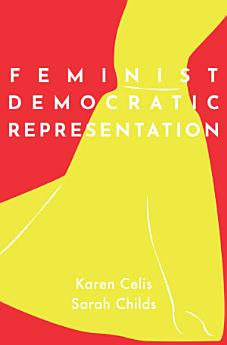Feminist Democratic Representation
Sep 2020 · Oxford University Press
Ebook
256
Pages
family_home
Eligible
info
reportRatings and reviews aren’t verified Learn More
About this ebook
Popular consensus has long been that if "enough women" are present in political institutions they will represent "women's interests." Yet many believe that differences among women--women disagreeing about what is in "their interest"--fatally undermine both the principle and the practice of women's group representation. In this book, Karen Celis and Sarah Childs redress women's poverty of political representation with a new feminist account of democratic representation. Rather than giving up on women's group representation, Celis and Childs re-think and re-design representative institutions, taking women's differences--both ideological and intersectional--as their starting point. Feminist Democratic Representation considers a broad spectrum of contemporary problematics--abortion, prostitution/sex work, Muslim women's dress, and Marine Le Pen--to discuss women's under- and misrepresentation and the "good, bad and the ugly" representative. As problem-driven scholars firmly grounded in feminist and democratic empirical and theoretical political science, Celis and Childs imagine what good representation for women in all their diversity could look like--representation as it should be. To realize this ideal in today's established representative democracies, they present a second-generation feminist design for parliaments and legislatures, underpinned by a re-thinking of feminist and democratic principles. Celis and Childs conceive of representation as a mélange of dimensions, and they shift the focus in women's group representation from feminist outcome to feminist process. Inclusive, responsive, and egalitarian representation for all women demands a new category of representatives in parliaments: the "affected representatives of women" who are epistemologically and experientially close to differently affected women. Affected representatives passionately advocate within political institutions, and publicly hold elected representatives to account. Feminist processes of representation have wide effects and deepen relationships between women and their democratic institutions. Against the more fashionable tide of post-representative politics, Feminist Democratic Representation argues not simply for more, but significantly better, representation.
About the author
Karen Celis is Research Professor at the Department of Political Science, and co-director of Research of RHEA Research Centre Gender Diversity Intersectionality of the Vrije Universiteit Brussel. She conducts theoretical and empirical research on the democratic quality of political representation from the perspective of disadvantaged groups and intersectionality. She is co-editor of The Oxford Handbook on Gender and Politics. Sarah Childs is Professor of Gender and Politics at Royal Holloway, University of London. Her research is centered on the theory and practice of women's representation, gender and political parties, parliaments, and institutional change. She is the author of New Labour's Women MPs and Women and British Party Politics, co-author of Sex, Gender and the Conservative Party with Paul Webb, and author of 2016 The Good Parliament Report on the UK House of Commons.
Rate this ebook
Tell us what you think.
Reading information
Smartphones and tablets
Install the Google Play Books app for Android and iPad/iPhone. It syncs automatically with your account and allows you to read online or offline wherever you are.
Laptops and computers
You can listen to audiobooks purchased on Google Play using your computer's web browser.
eReaders and other devices
To read on e-ink devices like Kobo eReaders, you'll need to download a file and transfer it to your device. Follow the detailed Help Center instructions to transfer the files to supported eReaders.






